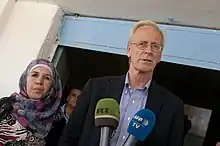William Roebuck
William V. Roebuck (born 1954) is an American ambassador who served as United States Ambassador to Bahrain from 2015 to 2017 and is currently the Deputy Special Envoy to the Global Coalition to Defeat ISIS.[1]
William Roebuck | |
|---|---|
 Roebuck in Al-Shaddadah, Syria, August 25, 2018. | |
| United States Ambassador to Bahrain | |
| In office January 20, 2015 – October 31, 2017 | |
| President | Barack Obama Donald Trump |
| Preceded by | Thomas C. Krajeski |
| Succeeded by | Justin Siberell |
| Personal details | |
| Born | 1954 |
| Alma mater | Wake Forest University University of Georgia Law School |
| Occupation | Lawyer, diplomat |
Early life
Bill Roebuck, who is from Rocky Mount, North Carolina, graduated from high school in 1974. He subsequently attended Wake Forest University, receiving a bachelor's and master's degree before attending the University of Georgia Law School.[2][3]
Career
He was confirmed as ambassador on November 18, 2014 and presented his credentials on January 20, 2015. He succeeded Thomas C. Krajeski and was succeeded by Justin Siberell.[4]
Activities in Syria
In August 2018, State Department representative William Roebuck traveled to the cities of Manbij and Kobani, both situated in Aleppo Governorate, as well as the town of Al-Shaddadah in Hasakah Governorate. He was later due to visit Deir ez-Zor Governorate which is held by U.S.-backed Kurdish forces. "We are prepared to stay here, as the president Donald Trump has made clear," he said after meeting with Democratic Federation of Northern Syria.[5][6]
Criticisms of Turkish intervention
In November 2019, Roebuck "criticized the Trump administration for not trying harder to prevent Turkey’s military offensive" in northern Syria.[7]
In November 2019, the New York Times reported that Ambassador William Roebuck, the senior U.S. diplomat in Syria drafted a memorandum to the U.S. Special Envoy to Syria James Jeffrey that stated directly that the U.S. should have done more to stop the Turkish invasion into Syria. He said "Turkey’s military operation in northern Syria, spearheaded by armed Islamist groups on its payroll, represents an intentioned-laced effort at ethnic cleansing and what can only be described as war crimes and ethnic cleansing."[8] He also warned that "we — with our local partners — have lost significant leverage and inherited a shrunken, less stable platform to support both our CT efforts and the mission of finding a comprehensive political solution for Syria."[9] The article said the Roebuck was the "second senior American official in the past week who has questioned whether the United States pressed hard enough with measures like joint American-Turkish ground and air patrols along the border, to avert a Turkish offensive into northern Syria" with the first official being Deputy Assistant Defense Secretary Michael P. Mulroy in an interview with Defense One.[10][11]
Exit Interview
In an interview with Defense One at the end of his career Roebuck commented on several areas. On Syria he said the damage to the relationship with the Syrian Democratic Forces has been repaired — because Donald Trump "ultimately agreed to keep a military presence in Syria, but we did lose significant leverage" amid the Turkish incursion into Syria, Roebuck said. "If you view our presence in northeast Syria as a source of leverage for some sort of future political solution [in the ongoing civil war in Syria], we pretty much overnight lost half of the territory that we were controlling, along with the SDF." [12] He continued that the U.S. failure to help rebuild in a more significant way "feeds a sense of resentment among residents in Syria that the coalition, led by the United States, came in and did all this destruction in order to defeat ISIS. And then just left and didn't help the people in a significant way," He said that this failure could give ISIS a chance to re-establish itself. The article also quotes a former Pentagon and CIA official Mick Mulroy as saying he is "one of the best expeditionary war zone diplomats I have seen in my career." [13]
References
- "William V. Roebuck". www.state.gov. United States Department of State. Retrieved 7 November 2019.
- "U.S. Ambassador to Bahrain: Who Is William Roebuck?". AllGov. 19 October 2018. Retrieved 14 March 2018.
- "Roebuck, William V." state.gov. U.S. Department of State (archive). Retrieved 7 November 2019.
- "William V. Roebuck". U.S. Department of State. 2015. Retrieved 21 December 2018.
- Middle East. "US official visits Syria's Kurdish-held territory". www.presstv.com.
- "Senior U.S. diplomat William Roebuck visits Syrian Kurdistan". Ekurd Daily. New York. 26 August 2018. Retrieved 21 December 2018.
- Schmitt, Eric (7 November 2019). "U.S. Envoy in Syria Says Not Enough Was Done to Avert Turkish Attack". The New York Times. Retrieved 7 November 2019.
- https://www.nytimes.com/2019/11/07/world/middleeast/us-envoy-william-roebuck-syria.html
- https://www.nytimes.com/2019/11/07/world/middleeast/us-envoy-william-roebuck-syria.html
- https://www.nytimes.com/2019/11/07/world/middleeast/us-envoy-william-roebuck-syria.html
- https://www.defenseone.com/news/2019/11/us-might-have-warded-turkeys-syria-invasion-says-dods-outgoing-mideast-policy-chief/161064/
- https://www.defenseone.com/policy/2021/01/exclusive-longtime-us-diplomat-weighs-americas-legacy-syria/171318/
- https://www.defenseone.com/policy/2021/01/exclusive-longtime-us-diplomat-weighs-americas-legacy-syria/171318/
External links
- William V. Roebuck at the U.S. Department of State